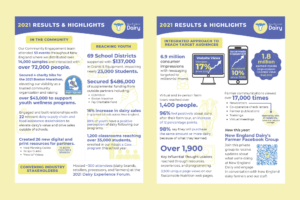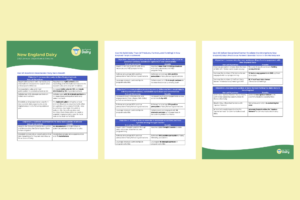
New England Dairy staff, delegates, directors, and guests gathered together in-person on November 4 and 5 in Essex, Vermont for our 2021 Annual Meeting.
Staff shared highlights and results from our work throughout the year and shared a first look into our plans for 2022 as we continue to work on your behalf building dairy trust and sales.
2021 Key Takeaways:
New England Dairy (NED) conducted consumer research to better understand the perceptions of dairy and barriers to consumption that would help shape our 2021 programming. The results helped us determine our areas of focus, as well as our target audiences. These groups hold purchasing power, are future consumers, and impact the decisions being made by the public. We know that each group has questions and concerns about dairy farming and dairy nutrition.
Millennial Moms: NED target consumer, millennial moms are juggling competing demands, cooking more at home, they may be working at home, and often they are unsure if dairy is the right choice for their families.
Gen Z: Youth are future consumers and the age group known as Gen Z is the bullseye. They are also juggling stresses like unknowns at school, connecting with their social networks, and doing the right thing for the planet and community. We want them to know that dairy is aligned with what’s important to them.
Thought Leaders: Thought leaders guide and advise what is recommended by health professionals, what schools serve, what is considered part of a healthy diet, what individual consumers do for their health and wellbeing. More than ever, they also impact how dairy is viewed as part of the climate change solutions. NED focuses specifically on the three groups: Registered Dietitians, Food Assistance Professionals, and Pediatricians.
Our target audiences are bombarded by a constant stream of information. Our goal is to meet them where they are and show them the positive impacts dairy farming and dairy nutrition have in our changing world. We are tapping into new and emerging farmer voices to showcase the work being done across the industry to address climate change. We’re using new information including milk’s “13 nutrient” messaging to further prove dairy’s role in a balanced diet. And we continue to drive sales inside and outside of schools.
Sustainability: Consumers are more curious about their food, where it comes from, and how it impacts the environment. NED is working to showcase how dairy farming and dairy foods are an important part of the fight against climate change. By highlighting local projects and programs, NED is demonstrating how the U.S. dairy industry is working to reach an important set of voluntary goals aimed at achieving GHG neutrality, optimizing water use and recycling, and improving water quality through responsible nutrient management.
Gen Z Farmer Voices: A focus at both the local and national level is to introduce the next generation of farmers to Gen Z and Millennials. Young, up-and-coming farmers have a knack for communicating with their peers. This younger generation is already active on social media and skilled at sharing farming information in fun and informative ways.
Dairy Nutrition:
- The new 2020-2025 Dietary Guidelines for Americans were released earlier this year and for the first time in its 40-year history, the guidelines include recommendations for infants and toddlers from birth-24 months of age. The guidelines positively position cheese and yogurt as complementary foods starting at 6 months and position cow’s milk as a preferred beverage starting at 1 year if breastfeeding has stopped.
- We have always said there are 9 essential nutrients in milk, but now we can say 13 essential nutrients. Milk is still milk. We just have more data available from USDA databases that show more of the nutrients found in milk meet the definition of being a good or excellent source.
Dairy Sales In & Out of Schools:
- Outside of schools, NED strives to be a catalyst for change, supplying industry partners with consumer insights to improve their marketing impact. Industry stakeholders, including processors, retailers, and dairy brands, were invited to attend two webinars where NED presented our consumer insights data. These webinars provided us the opportunity to be a credible voice to help influence innovation and product development.
- In schools, our programs are a great way to increase trust and sales. While schools account for 8% of fluid milk sales, 77% of the milk consumed by low-income children comes from school meals. School nutrition professionals are the gatekeepers to dairy sales in schools. When they trust dairy and use our programs, sales increase. Providing equipment grants and marketing support to schools removes the cost barrier and increases the likelihood a school will start a new program. So far in 2021, NED has provided $137,000 in equipment grants to 69 schools for programs including smoothies, meal expansion, and bulk milk.
Utilizing social media platforms and pitching and placing stories in local news outlets remain some of the most impactful places to reach our audiences. Millennial Moms, Gen Z, and Thought Leaders are consuming their content online and on their phones, these channels are where we must tell the dairy farming story. We continue to tell that story through influencers and digital advertising campaigns.
Social & Earned Media: As of Oct 1st, 2021, total social media impressions to date across Facebook, Instagram, Twitter, and LinkedIn are up 35% percent compared to this time last year. Engagement on social media is up by 10% percent. And as of Oct 1st, 2021, NED has placed 60 media stories generating a reach of over 1.8 million impressions (eyes & ears).
Influencer Partners: This past year, we took a fresh approach to our influencer partnerships and sought out new influencer partners to help us reach Millennial Moms and Gen Z. An important focus in our strategy is to ensure dairy is included in the holistic health and wellness conversation. Holistic health is about caring for the whole person providing for your physical, mental, spiritual, and social needs.
Digital Campaigns: NED continues to trend away from traditional TV & broadcast advertising as digital and social media advertising campaigns are more targeted, offer better metrics, and reach a more impactful audience. In 2021, NED digital campaigns generated 9.9 million consumer impressions (eyes & ears seeing content). These campaigns range from online activations with media outlets to podcast sponsorships, social media blitzes, and more.
2022 Programing:
We at NED challenged ourselves to answer the question: What do our target audiences really want? The answer: Permission to love/enjoy dairy and feel good about it. For 2022, we developed a unifying direction for the year to guide our key messages and to build dairy trust across all of our program areas.
Our 2022 direction: Keep it Real, Enjoy the Good. Every time you drink milk or enjoy your favorite dairy food, you’re doing good for you and your family, the community, and the planet.
This work will be achieved using three pillars:
- Health: We will focus on all the ways dairy is good for you and your family.
- Good for the Planet: We will highlight dairy’s sustainability story and tying into important moments in time such as Earth Day.
- Community: As schools reconvene, and people are focused on connecting with one another and giving back, we will share all the ways dairy is good for our local communities.

